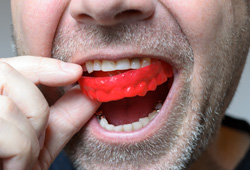Dental Implants – Stephens City, VA
A State-of-the-Art Solution for Missing Teeth
Your teeth are actually composed of two main parts: the crown, which you can see, and the root, which you can’t because it’s hidden underneath the gums. Traditional tooth replacements, like dentures and dental bridges, only bring back the crown. Dental implants distinguish themselves by restoring the root as well. The end result is that the new tooth both looks natural and is extremely stable, which is why Dr. Thomas A. Gromling recommends them so often. If you’re ready to stop dealing with your missing teeth and simply have a smile you can rely on, dental implants in Stephens City are the answer. Call us today to schedule your consultation!
Why Choose Thomas A. Gromling, DDS for Dental Implants?
- Partners with Trusted Dental Implant Specialists
- Dentist with Nearly 40 Years of Experience
- Fair Prices with No Hidden Fees
What Are Dental Implants?

A dental implant is a small titanium post that is surgically placed in your jawbone to act as an artificial tooth root. Titanium is a biocompatible material, so the implant encourages the jawbone to grow around it in a process called osseointegration. Once the implant is firmly in place, a metal abutment is installed on top of it, which allows us to anchor a custom dental crown, bridge, or denture (depending on the number of teeth you’re missing). When all is said and done, you can expect dental implants to look and feel just like the teeth you lost. Whether you’re eating your favorite foods, showing off your pearly whites, or practicing oral hygiene, it will be almost impossible to distinguish your implants from your real teeth!
The 4-Step Dental Implant Process

The dental implant process takes place over several months and multiple appointments, which some patients aren’t aware of when they schedule their initial consultation. Dr. Gromling works with a highly skilled and experienced team to make the procedure as quick and stress-free as possible, allowing patients to enjoy their newly restored smile sooner. Get ready to experience exceptional, long-lasting tooth replacement results that will improve your quality of life. Although it’s an investment in your time, you’ll learn that the outcome is well worth it.
Initial Dental Implant Consultation

The first, and one of the most important steps on your journey towards getting a revitalized and fully-functioning set of pearly whites, is your initial consultation. This visit creates the foundation for the rest of the process. During your appointment, Dr. Gromling, your implant dentist, will inspect your oral health and take several digital X-rays and images of your facial structure. Using the information he collects during this visit, he’ll create a detailed timeline of your procedure and determine the following:
- What type of restoration is needed.
- The cost of the procedure.
- How many implants need to be placed.
- Whether any preparatory procedures are required.
Dental Implant Surgery

Once you’ve had any necessary treatments, such as bone grafts, tooth extractions, or gum disease therapy, we can schedule your dental implant surgery. Dr. Gromling partners with some of the best oral surgeons and periodontists in his area. They have placed thousands of dental implants, so patients are sure to feel safe under their care.
The length of the procedure will depend on several factors, including where your implants need to be placed and how many you need. Our oral surgeons will create a small incision in the gums to place the implant underneath, acting as a replacement for the root of your missing tooth. They’ll then place caps over them for protection while you begin your healing process.
Dental Implant Osseointegration & Abutment

After your surgery, you’ll undergo a healing process that takes several months. This is imperative to the success of your restorations and allows time for the implants to fuse with your jawbone through a process called osseointegration. Depending on your health and how extensive your surgery was, it may take between three and six months for everything to fully bond and heal.
We’ll then call you back in to place the abutments, which are small metal connector pieces that will securely connect your restorations to the titanium posts. To make sure your restorations are crafted to look natural and comfortably fit in your mouth, we’ll take impressions to send off to our dental laboratory to create your bridge, crown, or denture.
Delivery of Dental Implant Restorations

When we receive your individualized replacement tooth or teeth that are made to our specifications, we’ll call you in for your final appointment. We’ll start off by removing your temporary restoration so we can attach your permanent ones. Once we’re through, you’ll be able to enjoy a beautiful, refreshed smile that’s fully functioning, allowing you to eat and speak with ease and confidence.
Benefits of Dental Implants

Dental implants are the only permanent way to replace lost teeth available today. With more than 500,000 dental implants placed annually, they are also becoming one of the most popular ways to replace missing teeth, too!
Because your dental implants are secured inside the jawbone, they not only restore the appearance and function of your smile, but they also provide many important oral health benefits that temporary restorations like dental bridges and dentures can’t touch. In fact, dental implants have the ability to transform your health, confidence and, and even your quality of life!
Day-to-Day Benefits

There are many benefits of dental implants that you can expect to enjoy every single day. Some of these benefits include:
- The ability to enjoy all your favorite foods without restrictions.
- Easier cleaning (just use a toothbrush, toothpaste, and dental floss like you do with your natural teeth).
- The confidence to share your smile with the world without fear of loose prosthetics, gaps in your smile, or obvious restorations.
Health Benefits

In addition to their beautiful appearance, your dental implants have many health benefits, too. These include:
- A strong, healthy jawbone due to proper stimulation.
- The ability to protect your remaining natural teeth.
- The ability to eat a healthy diet, including nutritious foods like crunchy vegetables and fruits, nuts, seeds, and anything else you’d like!
- No tooth sensitivity or gum sores like bridges or dentures sometimes cause.
- Easier care means better oral health and better overall health.
Long-Term Benefits

Not only do your dental implants offer myriad health and short-term benefits, but they also have many long-term benefits, too:
- A 95% implant success rate, even 10 years after placement.
- No need to replace your dental implants every five to ten years like dentures or bridges.
- Save time and money when compared to replacement, care, and maintenance costs of temporary restorations like dentures and dental bridges.
Who Dental Implants Can Help

Dental implants are versatile enough to help patients dealing with varying degrees of tooth loss. Dr. Gromling can help you choose which of the following restorative options is best for you:
Missing One Tooth

Instead of filing down two healthy teeth to support a bridge, a single implant can be placed directly into the jawbone and topped with a dental crown, leaving the rest of a patient’s natural smile untouched.
Missing Multiple Teeth

If a patient is missing more than one tooth in a row, just two implants can be used to hold a dental bridge in place. Two posts are positioned on either side of the gap in someone’s smile, and these are used to support dental crowns that are bonded to additional prosthetic teeth.
Missing All Teeth

A full denture can be secured directly to the jawbone using just four to six implants, giving it a security and stability that you simply won’t experience with a regular removable denture. Implant dentures also restore much more of a patient’s bite strength, helping them enjoy a more varied diet.
Learn More About Implant DenturesLearn More About All-On-4 Dental Implants
Understanding the Cost of Dental Implants

The cost of your implant procedure will be determined by a number of factors, including:
- How many implant posts will be used
- What kind of restoration you are receiving
- Where the implants will be located in the mouth
- If any preparatory procedures are needed (such as tooth extractions or a bone graft)
- If any sedation or additional X-rays are used
Dr. Gromling will go over everything at a consultation appointment, so you’ll know exactly what to expect. Dental implants should be considered a long-term investment in your dental health, because while they might be more expensive than traditional restorations, they last much, much longer (as in multiple decades longer). In general, dental implant patients usually end up spending much less on their teeth overall because they don’t require the maintenance or retreatment needed with other options.
Types of Dental Implants

There isn’t a set price for dental implants because the cost is determined by your individual treatment plan, such as the number of teeth you’re replacing. The more teeth you’ve lost, the more posts and abutments you’ll need. If you’re missing several teeth, it’s more cost-effective to choose an implant bridge or denture than to treat each tooth individually.
What Are the Stages of Dental Implant Treatment?

Your treatment will consist of multiple steps, each of which has separate costs. This can make it easier to pay for your new smile because you won’t need to cover the entire amount upfront. Although every plan differs, here’s what you can expect to pay:
- Initial Consultation: Besides the fees for the examination, you’ll also need diagnostic imaging and a CT scan to evaluate your oral structures to ensure you’re a candidate for dental implants.
- Additional Procedures: Many patients need additional procedures before their placement surgery, such as tooth extractions, periodontal therapy, or bone grafting.
- Placement Surgery: Sedation or anesthesia is needed during an oral surgery to place your implant posts into the jawbone. Besides the costs of the procedure, you’ll also need to pay for each implant post.
- Abutments & Restorations: A special fixture called an abutment needs to be placed on each post to connect your restoration. Your restoration is often the most expensive aspect of your treatment, but your dental insurance can help lower the cost.
Are Dental Implants Worth the Investment?

Dental implants cost more than traditional treatments, like a fixed bridge, but they are more affordable long-term. They have the potential to last for several decades with the right aftercare, so you’ll never need to pay to have them replaced like you would with other treatments.
Dental implants also lower your overall oral health expenses. The implant posts act as new tooth roots to stimulate your jawbone. This keeps any remaining natural teeth firmly in place to stop dental drift. As a result, you’ll lower your risk of cavities, gum disease, and additional tooth loss to save more money down the road.
Does My Dental Insurance Cover Dental Implants?

Every policy differs, but many insurance companies can cover a portion of the cost of dental implants until you reach your annual limit. After paying your deductible, your dental insurance may pay for certain aspects of your treatment to lower the amount you need to pay, like the CT scan or the restorations.
If you’re ready to rebuild your smile, contact our office today to schedule your consultation. We’ll help keep your new smile within your budget.
Maintaining & Caring for Your Dental Implants

Your new restorations can potentially protect and preserve your smile’s appearance and functionality for the remainder of your natural life, but only if they’re cared for correctly. Although they’re known for their strength and resilience, they can be harmed by oral issues like untreated tooth decay, gum disease, or other concerns.
Thankfully, taking a few simple precautions can help keep your dental implants in great shape for years to come. Continue reading to learn more about how you can help maintain them, and feel free to contact us for additional information.
Make Oral Hygiene a Priority

Dental implants are made from durable materials that don’t develop decay like enamel, but that doesn’t mean you no longer need to be concerned about consistently cleaning your mouth. The leading cause of failure is a progressive form of gum disease, called peri-implantitis, which can fortunately be prevented.
Brushing and flossing twice daily removes plaque and bacteria that contribute to cavities and periodontal problems, though take care not to push so deeply into the socket of your prosthetic that you damage its seal.
Eat a Healthy Diet

Your replacement teeth restore most of your original bite force so you can safely enjoy your favorite foods, but you should still be careful about what you eat. Your dietary decisions can greatly impact your dental implants.
For instance, eating overly hard, crunchy, or sticky foods could chip or crack them or destabilize them. Meanwhile, eating plenty of dairy products with calcium can strengthen your teeth and jawbone, and many citrus fruits and leafy greens are high in vitamin C to support your connective tissues.
Break Bad Habits

If you regularly use tobacco products, you will likely be asked to abstain for your dental implants to be successful. Cigarettes, vapes, and other products contain nicotine, which restricts your blood flow and oxygen levels. This renders your body unable to deliver essential nutrients to your mouth to recover after your procedure.
Protect Your Dental Implants

Athletes and others who participate in close-contact sports or activities are more prone to sustaining injuries that damage or dislodge their teeth and restorations. Fortunately, Dr. Gromling can provide a mouthguard to cushion your mouth and safeguard your smile.
Similarly, those who subconsciously grind their teeth at night may need a custom-fitted nightguard to shield their teeth from the constant pressure of clenching down, which can contribute to implant failure.
Schedule Regular Dental Checkups

Did you know the American Dental Association recommends scheduling a routine checkup and cleaning every six months? Consistent appointments with our team in Stephens City allow us to monitor your condition so we can catch and treat any areas of concern, like a destabilized dental implant, before they progress.
Dental Implant FAQs
How Successful Are Dental Implants?
Dental implants have an astounding 95% success rate! Not only is your initial placement very likely to succeed, but they’re also likely to continue to be successful well after ten years of wear and tear.
However, if you don’t maintain a good oral hygiene routine, your replacements might not last as long. Bacteria build up can lead to gum disease, which can leave your implants with very little support to cling to. To get the most out of your new teeth, make sure you brush twice daily, floss once per day, and visit our office every six months so we can keep tabs on your oral health and clean harmful plaque from your smile.
Am I Too Young to Get Dental Implants?
A wider range of ages can receive successful dental implants than you might think. As long as your jawbone is done developing, we can safely anchor this restoration. This does mean that patients younger than 18 are usually not suitable dental implant candidates. If you happen to be in your 20’s, though, we encourage you to consult with Dr. Gromling. A thorough oral exam and quality X-rays can tell us whether a dental implant treatment is right for you.
Do Dental Implants Decay?
Tooth decay occurs when harmful bacteria accumulate in your mouth, to the point where they start to break down your enamel. Tooth enamel is simply made up of strong, natural minerals like calcium and phosphorus, which is what makes it vulnerable to this process. Dental implants, on the other hand, are fashioned from inorganic materials. Though they may look incredibly similar to your natural teeth, they’re not so similar that bacteria would find them a tasty snack.
While dental implants basically can’t decay, it’s still important to stick to good oral hygiene habits. Regular cleanings will help your tooth replacements last longer and will lower your risk for gum disease. When dental implants do fail, it’s usually because gum disease has weakened the patient’s gumline and made it too difficult for the implants to stay in place. So don’t forget to brush your teeth twice every day, and floss between those pearly whites!
Do I Need a Bone Graft Before Getting Dental Implants?
A bone graft treatment is when we add density to a patient’s jawbone by transplanting bone materiel from a separate location (typically either an external source or from elsewhere in the patient’s body). This essentially means that you’ll only need a bone graft if your jawbone doesn’t have sufficient mass for supporting successful implants. Sometimes decay can take a toll on your jawbone as well as your teeth, and if you’ve had a gap in your smile for a while, there’s a chance the bone has atrophied due to lack of blood flow.
Rest assured that a bone graft can solve this dilemma in most cases, and your dental implant team will do everything they can to check your jawbone for potential complications before rushing your treatment. Thorough caution is part of what makes dental implants so successful, after all!
